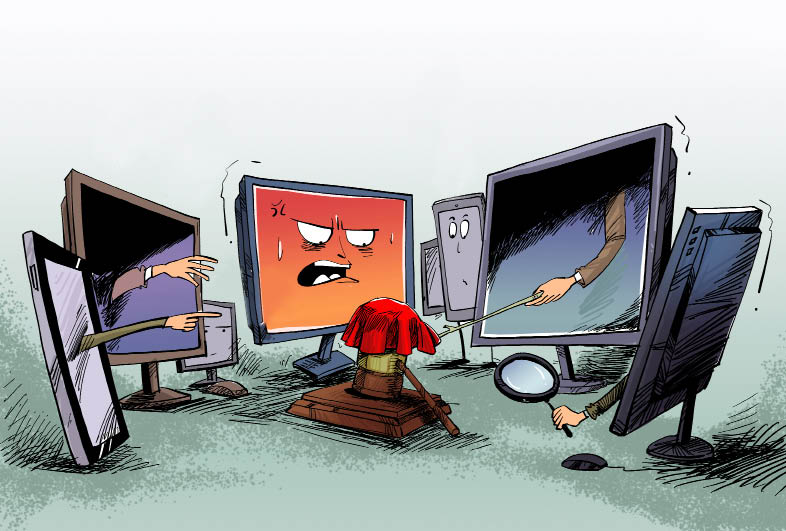Breakthroughs in Judicial Reform
- By Jiao Feng
 0 Comment(s)
0 Comment(s) Print
Print E-mail China Today, February 27, 2014
E-mail China Today, February 27, 2014
| The judiciary in the self-media era. |
Unblocking the Institutional Bottleneck
The judicial system is an important part of the legal system. In recent years, complaints about the unfairness of the judiciary have been on the rise and its waning credibility could be attributed largely to the irrational workings of the system.
"Judicial independence solves the disproportional power disposition of the judicial system," Cao said. He went on to explain that there are currently two flaws in the existing judicial system, "Internally, the upper and lower levels of judicial offices are not independent, and the lower level offices have to submit to opinions of the upper level on cases; externally, the staff, finance and resources of the judicial office are controlled by the local government. This results in less power to exclude factors influencing the case. The judicial office, therefore, is not independent enough to guarantee an independent judgment."
The Third Plenary Session of the 18th CPC Central Committee demanded reform of the judicial system to promote unified management of the staff, finance and resources of the courts and pro-secutorates below the provincial level, and to explore a system that is discrete from the administrative divisions. It also put forward improvements in the operating system of the judicial powers and an accountability system whereby the presiding judge and collegiate bench jointly make judgments and take equal responsibility.
The Intermediate People's Court in Foshan, Guangdong Province is one of the pilot courts selected by the Supreme Court to trial the new judicial authority operating system. Since March 2013, the court has been the first in the country to implement presiding judge accountability. It selected 35 presiding judges to take charge of cases, and established the mode "1 presiding judge + 3 or 4 collegiate judges + several judicial assistants and court clerks." It endowed relatively complete rights on presiding judges to make them "real judges."
The Supreme Court also carried out pilot projects in Shanghai, Jiangsu, Zhejiang, Guangdong and Shaanxi. It required the pilot courts to strictly implement related regulations on procedural law, establish an operating system of judicial power in line with legal rule and eradicate administrative interference during the procedure; strictly implement the accountability of the presiding judge, collegiate bench and judicial committee to ensure the unification of power and responsibility; improve the procedural rules and working mechanism of the judicial committee; and regulate the scope of case discussions. The pilot study was supervised and assessed by the Supreme Court, who will publicize their findings and roll out the new mode nationwide if the system is deemed successful.
"If there is no judicial independence, justice is compromised," said Cao. "The presiding judge should have the power of independent judgment in cases because making judgment is a rational action, not the whim of leading officials or administrative powers. Therefore, delinking the judiciary from the local government is one of the most important reform targets."







Go to Forum >>0 Comment(s)